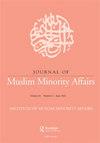传统伊斯兰组织角色的变化:恢复的波斯尼亚伊斯兰社区面临的三大挑战
IF 0.4
0 RELIGION
引用次数: 0
摘要
摘要自1882年以来,波斯尼亚伊斯兰社区一直领导着巴尔干地区大多数斯拉夫穆斯林的伊斯兰事务。虽然独裁和世俗主义国家对其生存构成了相当大的危险,但独立的波斯尼亚的自由带来了一系列挑战。自20世纪90年代以来,面临着三大动力:占主导地位的波斯尼亚党努力让伊斯兰社区参与领导波斯尼亚人的国家建设运动;伊斯兰当局的多元化和来自伊斯兰世界(特别是来自伊朗、沙特阿拉伯和波斯湾以及土耳其)的影响;以及该国伊斯兰社会日益多元化。所有人都对波斯尼亚伊斯兰社区的做法、权威和垄断提出了各种各样的挑战。波斯尼亚和黑塞哥维那伊斯兰共同体(波黑伊斯兰共同体)通过逐步脱离国家政治、平衡外国影响和建立其机构能力,应对了这些挑战。本文章由计算机程序翻译,如有差异,请以英文原文为准。
The Changing Role of the Traditional Islamic Organization: Three Challenges to the Restored Bosnian Islamic Community
Abstract The Bosnian Islamic community has led the Islamic affairs of most Slavic Muslims in the Balkans since 1882. While authoritarian and secularist states represented considerable dangers for its survival, freedom in independent Bosnia brought its set of challenges. Since the 1990s, is faced three major dynamics: efforts of the dominant Bosniak Party to involve the Islamic Community in spearheading the nation-building drive among the Bosniaks; the pluralisation of Islamic authorities and influences coming in from the Islamic world (especially from Iran, Saudi Arabia and the Persian Gulf, and from Turkey); and the increasing pluralisation of the Islamic scene within the country. All have variously challenged the Bosnian Islamic community’s practice, authority and monopoly. The Islamic Community in Bosnia and Herzegovina (IZ BiH) has met those challenges by gradually detaching itself from national politics, by balancing foreign influences and by building up its institutional capacities.
求助全文
通过发布文献求助,成功后即可免费获取论文全文。
去求助
来源期刊

Journal of Muslim Minority Affairs
RELIGION-
CiteScore
1.40
自引率
0.00%
发文量
31
期刊介绍:
Journal of Muslim Minority Affairs is a peer reviewed research journal produced by the Institute of Muslim Minority Affairs (IMMA) as part of its publication programme. Published since 1979, the journalhas firmly established itself as a highly respected and widely acclaimed academic and scholarly publication providing accurate, reliable and objective information. Journal of Muslim Minority Affairs provides a forum for frank but responsible discussion of issues relating to the life of Muslims in non-Muslim societies. The journalhas become increasingly influential as the subject of Muslim minorities has acquired added significance. About 500 million Muslims, fully one third of the world Muslim population of 1.5 billion, live as minorities in 149 countries around the globe. Even as minorities they form significant communities within their countries of residence. What kind of life do they live? What are their social, political and economic problems? How do they perceive their strengths and weakness? What above all, is their future in Islam and in the communities of their residence? The journal explores these and similar questions from the Muslim and international point of view in a serious and responsible manner.
 求助内容:
求助内容: 应助结果提醒方式:
应助结果提醒方式:


